
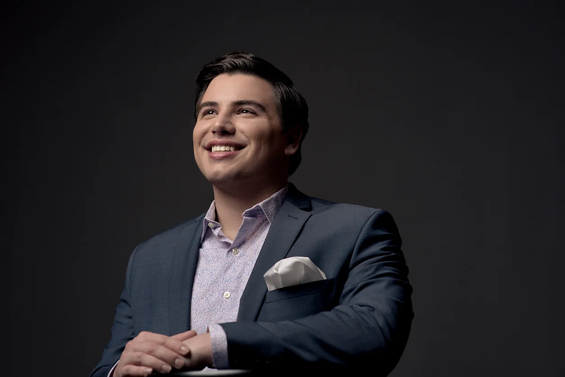
photo: Simon Pauly
TEN QUESTIONS WITH ERIC FERRING
A multiple award winner and graduate of Drake University, The Boston Conservatory, the Lyric Opera of Chicago's Ryan Opera Center, and the Pittsburgh Opera Resident Artist Program, American tenor Eric Ferring is enjoying a flourishing career singing roles such as Pong (Turandot) and Arturo (Lucia di Lammermoor) for the Metropolitan Opera, Santa Fe Opera, and other renowned companies. Next month, he'll appear as Tamino in the Opéra national du Rhin's production of The Magic Flute, and on the horizon are performances as Lysander (A Midsummer Nights Dream) at Opéra de Rouen Normandie and Lurcanio (Ariodante) at Opéra national de Paris (Palais Garnier). On the recording front, this month sees the release of Ferring's solo debut album, No Choice but Love: Songs of the LGBTQ+ Community, with pianist Madeline Slettedahl, a double-album release (reviewed here) of profound musical value and thematic significance. textura was delighted to speak recently with Ferring about this important project.
01. Your latest release with pianist Madeline Slettedahl, No Choice But Love, highlights diverse LGBTQIA+ voices and perspectives with works by living and passed LGBTQ+ composers. Was there a particular “a-ha!” moment when the project suddenly struck you as one you had to tackle or was it something that had been gestating over a long period of time and recently suggested now was the right time to do it?
As members of the LGBTQ+ community, I think Madeline and I always wanted to have our debut album speak to who we are as people in a sincere, meaningful way. There is so much hate and violence in our world and towards our community, whether it be assaults, shootings, attacks on our rights to play sports, or use the bathroom. It seems that for as far as we have come in this century, there has also been a renewed effort to belittle, change, or erase those in marginalized communities. To combat that, we want to inspire, encourage, celebrate, and love the beautiful, important musical and artistic contributions that our community has created. Whether that be in the music and text, the commissioning of a new piece, the artists themselves, or people in the production team and photography, our album highlights the incredible talents of the LGBTQ+ community as well as our legacy and continued impact in the classical world and beyond.
02. In a note included on the release package, you identify yourself and Slettedahl as members of the LGBTQ+ community. Could you share a little bit about your own story and the challenges you had to deal with? That your site includes the words “I am an artist with a history of love, pain, joy, and sorrow” suggests the road hasn't always been an easy one, despite the incredible success you've achieved in your career.
Yes. I am an openly gay may and Madeline a bisexual woman. I can't speak to her own struggles in discovering who she was and her desire for acceptance, but I came out when I was sixteen in a very conservative Catholic town. I was kicked out of my house for almost a month, while I bounced from friend's house to friend's house, as my parents dealt with what at the time felt like a blow to who they were and who they “raised me to be.” I, unfortunately like so many, was also teased and bullied throughout high school (and before I came out) by those who felt they were better, needed to exert their “manlihood,” etc. It wasn't until college that I really started to feel comfortable with who I was, and by the time I met my now husband while I was a Resident Artist at Pittsburgh Opera, my parents had become nothing but supportive and loving. Though I just recently lost my father, both my parents walked me down the aisle at my wedding last year, and it's a memory of growth, love, and devotion I will never forget.
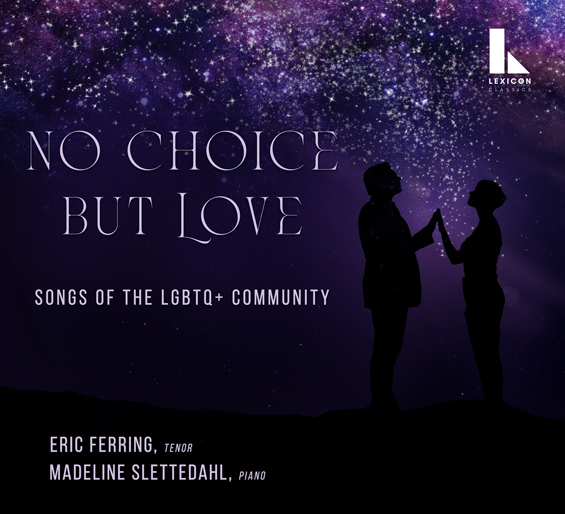
03. You also write that the two of you “wanted to pay homage to the beautiful, difficult history of the LGBT+ community within the classical music world by featuring the many talented living and passed LGBT+ composers.” In your estimation, is there greater acceptance within the classical world of LGBT+ artists than outside it, or are the challenges the same everywhere?
From my vantage as a young gay classical musician, I think queer people have in the past and still go find themselves within the arts. Whether they love the art itself or just want to find shelter from the storm, music and art have always been safe havens for those outside “the norm.” Whether you're questioning your sexuality, gender identity, or both, I think it's safe to say that most art circles are more accepting than a general workplace or social group. That said, I certainly think we've made strides in both regards outside of the musical world. Two steps forward, one step back: for example, we finally have marriage equality in the U.S. and most recently Mexico, and yet the amount of transgender hate bills emerging in America has been shockingly numerous, with devastating consequences, and are frankly mortifying. Menstruating people (because not all those who menstruate are women) have also lost their right to control their own bodies, which also affects the queer/trans communities. This is another reason why an album like this is still important—these fights are not over. As much as some in our country would like us to believe—complacency lets others forget us, or erase us all together.
04. As you devised the set-list for the release, did you consult with Ben Moore, Jake Heggie, Jennifer Higdon, Mari Esabel Valverde, Willie Alexander III, and Ricky Ian Gordon about the material of theirs that would be included on the release?
Madeline and I took a few years to discover and balance the repertoire on this release which we finalized during the pandemic. That said, when we found Ben Moore's piece Love Remained, for example, I reached out because I wanted to see if he'd be willing to transpose it for tenor, as it was originally written for baritone. Those conversations eventually led to that materializing, as well as us commissioning him for the world premiere title track piece. Jake Heggie's piece fit perfectly with Poulenc's Tel jour, telle nuit, which we already knew we wanted to feature on the album, so that seemed natural. We listened through most of Jennifer Higdon's solo repertoire and found Lilacs, set to a poem by Walt Whitman, and thought it would be a perfect addition. We worked with Mari Esabel Valverde to solidify the poetry rights with the Danish publisher who owned them, so we had the pleasure of getting to know her well during the process. Willie Alexander was so generous as well, and we listened through quite a number of his pieces before we settled on his setting of Sure on this Shining Night. As for Ricky Ian Gordon, he has so many pieces that would fit this album perfectly, but we went with Joy and Prayer which provides something contemplative, as well as something uplifting. We enjoyed working with each of them in a variety of ways as we crafted the vision of this album and are so excited to share it with the world!
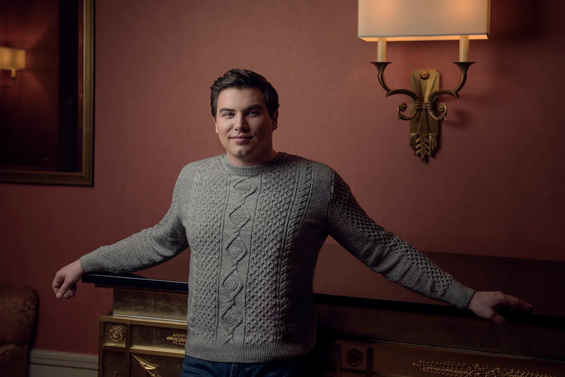
photo: Simon Pauly
05. Relatedly, how did you narrow the choices down to Manuel de Falla, Ethel Smyth, Francis Poulenc, and Benjamin Britten to represent work by non-living composers when others also could have been included?
It was honestly a struggle to decide who to include. We knew we wanted to have Poulenc and Britten create the “foundation” for the album as two of the most well-known gay composers. From there, we went from Britten to Ethel Smyth, both from the UK (Ethel being an incredible lesbian suffragette—her piece On the road is a fight song for any era and any marginalized group: “How can we fail when we fight for the sake of the light?”) From Poulenc, we went to Jake Heggie's Friendly Persuasions, which is an homage to Poulenc. It features the four closest relationships Poulenc had in his life and actually mentions the writing of Tel jour, telle nuit in it. After that, we wanted to search for some music in other languages but perhaps also by a composer people might know. That left a number of options: de Falla and Tchaikovsky to name two. All I will say is that there are most certainly enough composers (and their music) to have a sequel one day… stay tuned.
06. Certainly all of the works featured on the album are key to No Choice But Love, yet there's no denying the importance of Ben Moore's Love Remained, which comprises “Hold On,” “Uncle Ronnie,” “Love Remained,” and “Hope,” and the closing title song, which you commissioned from him in 2021. Could you say a few words about what makes his songs so pivotal to the album and its theme?
Ben really helped create an atmosphere for this album by providing the perfect bookends to this album. Love Remained, in its first commercial recording on this album, speaks directly to a number of queer experiences and struggles. Whether it be the rise in LGBTQ+ teen suicide, to suicide of a gay loved one, to coming out to a sibling, or a queer person being elected, this piece sets the tone of the album and the importance of it living in our modern world. Though the majority of the pieces don't talk directly to queer experiences like Love Remained and the title track commission, it was important to us that the beginning and end of this album did.
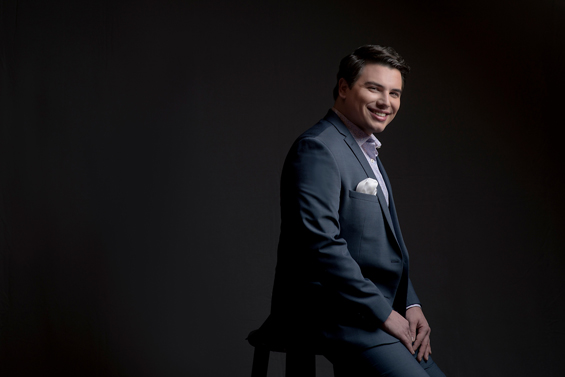
photo: Simon Pauly
07. Could you elaborate on how the album's title song came about?
For No Choice but Love, we talked to the poet, Terrence Chin-Loy, about what we wanted the album to say at the end. We often hear from conservatives that gay people “choose” to be gay, and they can “choose” something else. Like the title of the album, I wanted to directly, and proudly, say that we have no choice but love. Love is the only choice we have in this life. “It's only natural to hold you close. It's only natural that with you time slows…I know this name, love.” With those thoughts in mind, Terrence created a stunning poem, which we sent to Ben who eagerly jumped on board and started creating the beautiful aural landscape you hear today.
08. When I hear about the challenges some teens experience in dealing with issues of gender identity, I think how incredible it would be if a copy of your album were sent to every high school music department and for a song like Moore's “Hold On” to be heard by students wrestling with gender identity. What are the realistic goals you and Madeline have for the project in terms of what it might accomplish?
Wouldn't that be phenomenal? I hope that this album gets heard by those who need to hear it most. We created this album, with the little platform that we have built as artists so far, to inspire and to celebrate artists who might not have been celebrated before and to help, in whatever small way, to better our slice of the world. It's incredibly important that LGBTQ+ teens and adults see themselves in albums that are being created and music that is being commissioned. I hope that a young trans woman who is interested in writing music listens to Mari's stunning Danish pieces and feels inspired in a new way. I hope black composers and poets hear Willie's Sure on this Shining Night and Terrence's No Choice but Love text and feel seen and encouraged in new and profound ways. Like Harvey Milk says, “You have to give them hope.” If we give them even an ounce of hope, we will have accomplished more than I could have ever hoped for.
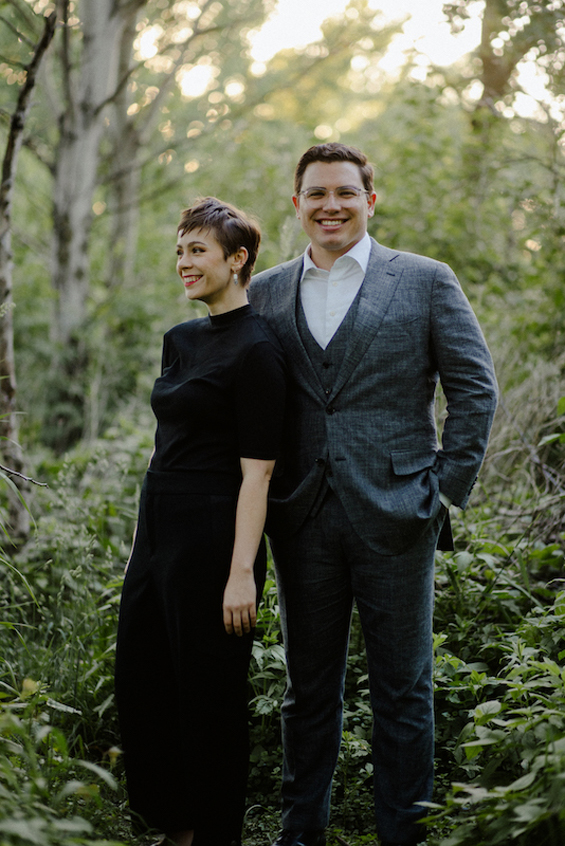
photo: Jaclyn Simpson
09. You clearly have a special bond with Slettedahl, as indicated by your many recordings together; you also have the album We have tomorrow, with her and the French string quartet Quatuor Agate, scheduled for release in late 2023. Could you say a few words about the relationship the two of you share and how it began?
Madeline and I were both in the Ryan Opera Center at Lyric Opera of Chicago for two seasons, and it was there that we immediately connected as colleagues and dear friends. While there, we had the privilege of taking part in the partnership between WFMT (Chicago's classical radio station) and the Ryan Opera Center, and recorded numerous recitals that were broadcast on air with a wide variety of repertoire. After realizing our natural partnership creating music together, we began to slowly build albums that we would love to make a reality and set the groundwork to make that happen. We reached out to WFMT and to four-time Grammy award-winning sound engineer Christopher Willis to see if they'd be interested in continuing the relationship once we left the Ryan Center, and from there the rest is history! We recorded No Choice but Love there (with the amazing Rebecca Folsom as our producer) and we will be recording the chamber music album, We have tomorrow there (the incredible Julia Faulkner producing) next June. Methinks there will be more to come after that as well!?
10. You made your Metropolitan Opera debut during its 2021-22 season in Turandot (Pong), The Magic Flute (Tamino), Lucia di Lammermoor (Arturo), and other productions; you've also performed with the Santa Fe Opera and many other companies and are scheduled to perform with the Opéra de Rouen, Opéra de Paris, and the Opéra national du Rhin. Is there a particular role you find most satisfying to sing, and are there particular roles you haven't sung but one day hope to?
I certainly love Die Zauberflöte. It is one of my favourite roles to sing and has some of the best music ever written. I've only had the chance to sing one Nemorino and would absolutely love to sing that role that again soon (*hint hint!*). As for roles I haven't had the chance to do yet, Ferrando in Cosi fan tutte and Tom Rakewell in The Rake's Progress are at the top of the list!
website: ERIC FERRING
November 2022![]()